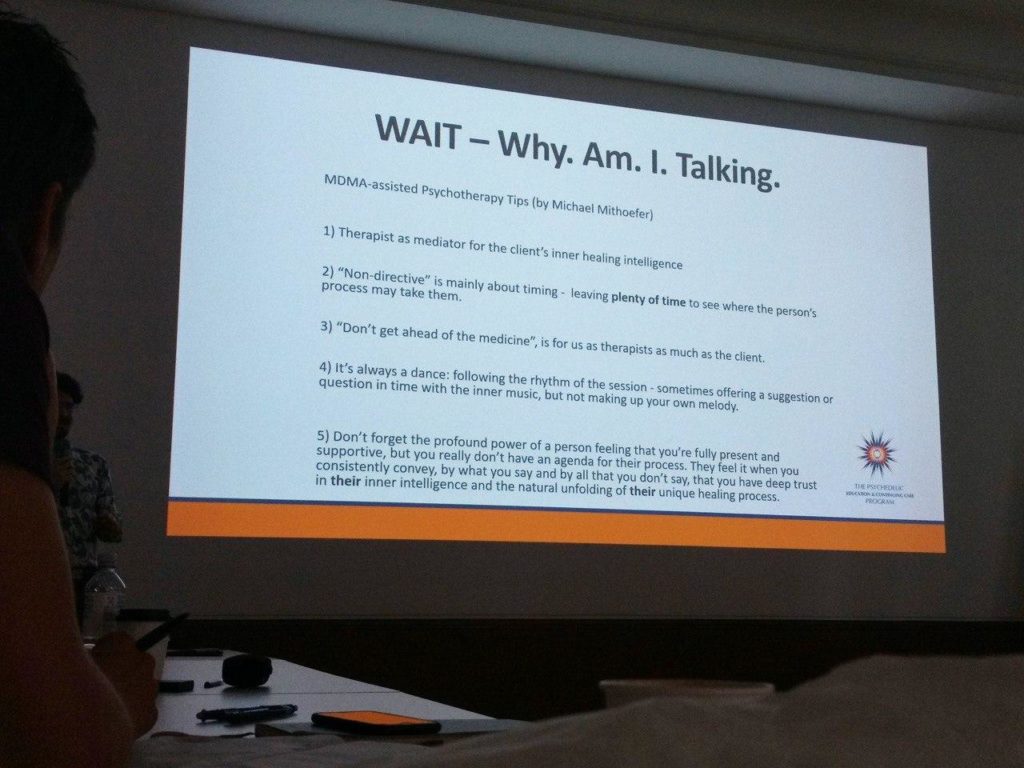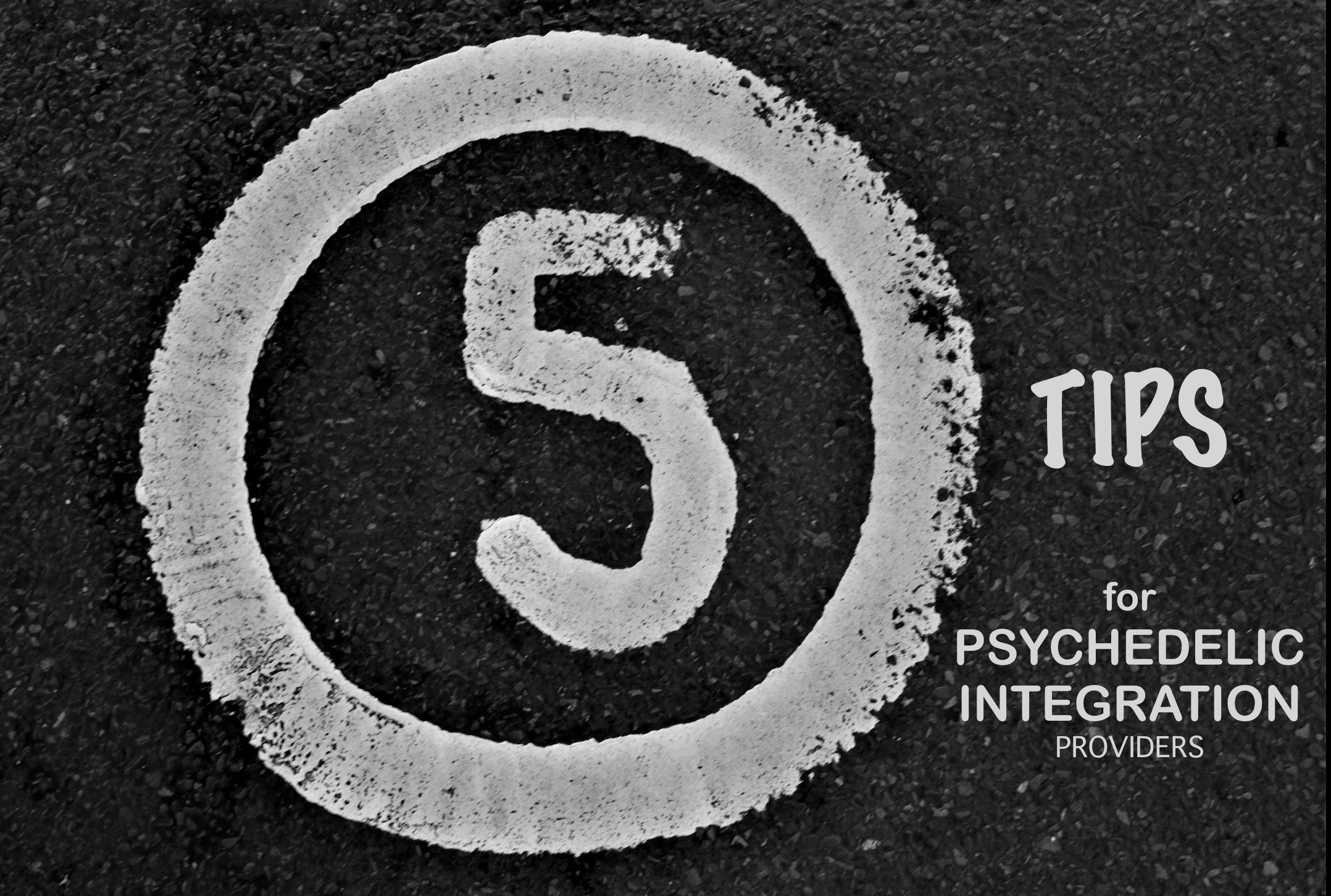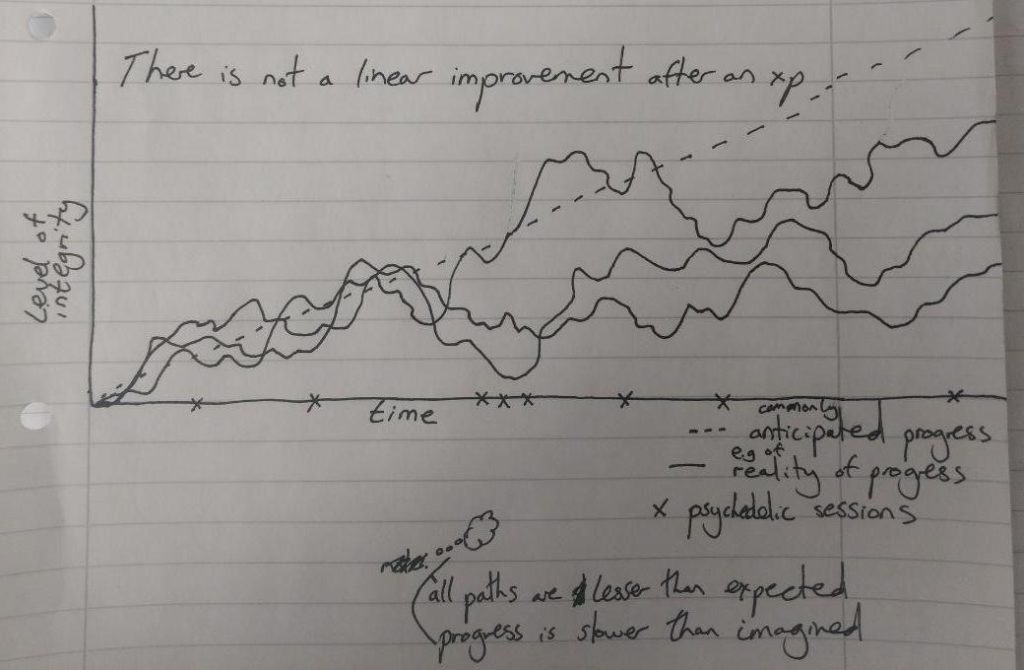If you are a psychedelic integration coach, provider or just interested in becoming one, this piece shares five best practices when providing services and helping others with their integration process.
If integration is a new term to you, start here:
Here are the contents, I’ll expand on each point below.
- Understand What You Are Practicing
- Manage Expectations
- Don’t Be The Arbiter Of Truth
- Don’t Assume (You’ve Had The Same Experience)
- Seek Continued Development
Credits
Before beginning, I’d like to acknowledge that this piece is pulled from my notes from workshops, webinars and presentations on the topic. Primarily, from an excellent webinar on integration hosted by MAPS last summer which featured two people I consider leaders in the field: Marc Aixalà, and Ingmar Gorman. Some is also taken from a workshop with Ingmar at Insight Conference in Berlin last year. You can find out more about them at the bottom of this post.
Alright, let’s get into it!
1. Understand What You Are Practicing
Integration is a broad term and will look very different depending on a person’s needs. One factor in determining a person’s needs is when you see them in relation to their psychedelic experience.
In this scale from Ingmar, we see that there is the post acute psychedelic effect on the left end, and long term psychotherapy on the right.
The post acute psychedelic effect on the far left would be the hours and days directly following an experience, sometimes known as the ‘afterglow’ period, where as on the far right it would be a long term and ongoing therapeutic relationship.
Working on a psychedelic retreat where you are with people directly after their experience, for example, will be on the far left of the scale. If you are conducting a follow up call two weeks later, you will be closer to the middle. If you are working with someone in an ongoing process over many months and years, you will be on the right side.
Another factor to consider is how a person is doing following the experience: did it bring difficulties or benefits?
On this scale from Marc, we see the different ideas of what could constitute integration, from dealing with undesired effects (e.g. emergence of repressed traumatic memories) to maximising benefits (e.g. greater sense of peace, connectedness, more mental clarity).
Working on the left end of the scale requires more specialisation and looks more like a clinical practice, whereas further to the right could look more like coaching.
Knowing where you are practicing on these scales should inform your approach and help you to know what you are capable of doing. For example, for a therapist, empathy alone is not sufficient; a capacity to recognise what is happening with transference and countertransference and how to respond to that, is also necessary.
Although they can be combined, integration and psychotherapy could be very different processes, so be clear about which you are doing. Acknowledge your level of expertise and limitations, and be ready to refer when helping someone effectively is outside of your scope.
2. Manage Expectations
Psychedelics are getting hyped. Retreats are the new trend. Trips are the latest ‘cure all’. Stories of seemingly overnight change in the media are backed by incredible results from clinical studies.
A desire for fast change is fed by our cultural leanings to quick fixes and instant gratification and the idea of a ‘magic bullet’ is very appealing and draws many people to psychedelics.
Coming back to reality after a ceremony or retreat, and the realistic pace of change, can bring a surprising realisation that there is continued work to be done.
The non-linear rate of improvement after an experience can fall short of people’s expectations, and this can lead to disappointment and frustration.
Falling back into old ways, as often happens on a path of growth, can also bring a sense of failure.
Handling these challenges can be handled well by managing expectations and bringing them to a realistic level.
Of course, hope is an important factor in the process.
So how does one manage expectations whilst maintaining a sense of hope?
It is very useful to first try to understand, what is their expectation of the outcome?
If expectations are high, then balance bringing them to a more realistic level with keeping a sense of optimism and hope.
10 Years of Therapy Insight
It’s often heard that psychedelic sessions are ‘like 10 years of therapy’ or ’10 years of transformation’. Sat next to me at Ingmar’s workshop in Berlin, Marlene Rupp of the excellent Sapiensoup put it perfectly in more real terms: ’10 years of insight’.
See Marlene’s talk at Beyond Psychedelics here:
How To Start A Psychedelic Integration Circle
Insight isn’t worth much until it is realised and actualised in the world; when it is integrated. There is a big difference between understanding a profound truth and embodying it. We could all read a quote from a text or book, but getting to the place of living in accordance with that wisdom is something else. This takes time and effort, something useful to recall in managing expectations.
A useful way of putting it that Marc shared is:
“You will have an experience.
That experience can be very useful, if you do something with it.”
3. Don’t Be The Arbiter Of Truth
It can be the case that a repressed or traumatic memory is recovered during a psychedelic session. For example, abuse from a family member.
In this scenario, the person who has experienced or re-experienced the memory may ask you if it is true, if it really happened.
Even if they don’t say it in words, they may in one way or another be fishing for a confirmation on the validity of their memory.
When it comes to recovered memories, the advice is simple: if you are in any way asked about their validity, do not confirm one way or the other.
The only correct answer you can give is ‘I don’t know’. A false confirmation one way or the other can have seriously negative consequences.
Worth mentioning here is Elizabeth Loftus and her groundbreaking work on false memories, including recovered memories of childhood sexual abuse – very interesting stuff for those inclined.
In general, be very careful when interpreting others’ experiences. This leads us nicely on to…
4. Don’t Assume (You’ve Had The Same Experience)
Someone comes to you who has recently had deep and powerful mushroom trip. Perfect, you’ve had many deep and powerful mushroom trips so you know exactly what they’re going through.
Not so fast.
Just because you’ve consumed the same substance as someone else, be it ayahuasca, truffles, acid or any other, it doesn’t mean that you’ve had the same experience. It doesn’t mean they were even remotely similar.
No matter how many similarities there may be, you can’t assume you’ve had the same experience. The width and variety of psychedelic (and life) experience should never be underestimated.

That Don Miguel was on to something
Now of course, there can be similarities (and if so, great, because then your experience and learnings will be more easily translated to the other person). But if there are, then try to uncover them with non-directive questioning and patient listening, rather than assuming them from the start and then reaching them skewed by confirmation bias.
When it comes to asking questions, I personally try to take the approach of a non-judgemental exploration characterised by curiosity – seeing the interaction as a means to explore the person’s inner world alongside them. Rather than knowing and leading, trying to go deeper and uncover more.
As an integration coach, it isn’t necessary to share your own personal psychedelic experiences. After all, this isn’t about you. What is more important is that you let them know that you understand the challenges they are facing.
Be A Good Listener
On this point I think it’s useful to emphasize the importance of being a good listener.
“There are three things you can do to help someone. The first is to listen. The second is to listen. The third is to listen some more.”
When you find yourself talking, WAIT.
That is, remember the acronym:
W. A. I. T.
Why Am I Talking?

From Ingmar’s workshop at Insight Conference 2019
5. Seek Continued Development
Continued and sustained effort is fundamental to becoming great at anything. As Goenka would say; diligence, patience, and persistence.
As I’ve mentioned before, I believe the best way to learn comes from a combination of both study and practice, so read plenty, and seek practice where you can.
However, this final point is a tricky one. As psychedelic integration is a nascent field, there aren’t really any obvious ways to go about further development. By contrast, if you want to become a psychotherapist, for example, there are some pretty clear roadmaps to do so. How to become an integration provider on the other hand, isn’t so clear.
Globally, our only long standing traditions around using psychedelics have survived through indigenous cultures – e.g. Native American Indians, Amazonian tribes – where practice has never been totally discontinued and knowledge around practices has been passed down through ancestral lineage.
Because of the preservation of practices in those cultures, experiences are naturally integrated in to their communities. For this reason, they don’t really have models for integration that are applicable to us in the West. Here, psychedelics have only recently begun to emerge as a tool for awareness, growth and therapeutic application, and as such are not integrated in our society.
Though we currently lack these systems, they are on the way. In the meantime, seek education and practice where you can; go to workshops, start a circle, learn in related areas e.g. breathwork, mindfulness, support group and community building. Marc gave a couple hints: become a good listener, and become a good therapist in whatever school you’re comfortable in.
You can find some useful and related resources in this post:
If you have any further tips, resources, or ideas, feel free to get in contact.
Thanks for reading and have a great day.
.
Resources & Credit:
As promised above, here is more information on Marc and Ingmar. I’ve been lucky enough to attend in person workshops with both, a tripsitting workshop in 2017 by Marc in Copenhagen and an integration one with Ingmar last year in my home city of Berlin. They both have a lot of experience in the field and I’d recommend both as good sources of information.
Marc Aixalà is an engineer, psychologist, psychotherapist and certified Holotropic Breathwork facilitator, specialized in supporting people who face challenging situations after experiencing non-ordinary states of consciousness. He coordinates support and integration services at ICEERS. You can find out more about ICEERS here.
Ingmar Gorman is a psychologist who specializes in assisting populations who have had experiences with psychedelics and other psychoactive compounds. He is director of the Psychedelic Education and Continuing Care Program, and co-founder of Fluence.






